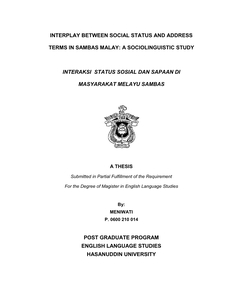Meniwati, Meniwati (2013) INTERPLAY BETWEEN SOCIAL STATUS AND ADDRESS TERMS IN SAMBAS MALAY: A SOCIOLINGUISTIC STUDY. Thesis thesis, Universitas Hassanuddin.
meniwati-2579-1-13-meniw-4 1-2.pdf
Download (285kB)
![[thumbnail of cover]](/10128/2.hassmallThumbnailVersion/meniwati-2579-1-13-meniw-4%20cover1.jpg)

meniwati-2579-1-13-meniw-4 cover1.jpg
Download (235kB) | Preview
meniwati-2579-1-13-meniw-4 dapus.pdf
Download (370kB)
meniwati-2579-1-13-meniw-4.pdf
Restricted to Repository staff only
Download (1MB)
Abstract (Abstrak)
This research is aimed to (1) find out the general address terms based on
social status and age, (2) find out the function of address terms used by Sambas
Malay, (3) explore what factors that affect the choice of address terms in Sambas
Malay based on social status, (4) construct the patterns of address terms of
Sambas Malay.
This research was carried out in Sambas Regency and Teluk Keramat subdistrict.
The method use was field survey by giving a questioner to 24 persons,
recording conversation and interviewing some respondents of lower social status
and higher social status, which each social status is divided into old and young
people. The sample was selected using purposive sampling method in Sambas
Regency and Teluk Keramat sub-district as the representatives. The data were
analyzed by qualitative describing with identifying, classifying, analyzing, and
describing.
The result shows that the address terms in Sambas Malay is numerous,
then classified into forms that based on the functions. The most Common address
forms that are used are the common address terms (C) and Honorific address
terms (H). These functions in three sort of dyadic pattern, that are the Mutual C,
The mutual H, and the non-reciprocal H – C. The semantic distinction between the
two mutual patterns and non-reciprocal pattern is on the user dimension. The
Mutual H more frequently used by high social status than low social status, while
the Mutual C more frequently used by low social status. That means that the
politeness systems in Sambas Malay is the negative politeness (Brown and
Levinson, 1987), more closed someone, more use the honorific address terms. In
the non-reciprocal pattern a distinction is made in terms of social status with the
higher saying C and the lower H. The distinction of using the address terms are
influenced by occupation and educations, while the intimacy/distant does not give
any significant differences.
Key Words: Address Terms, Sambas Malay, Social Status.
| Item Type: | Thesis (Thesis) |
|---|---|
| Subjects: | P Language and Literature > PB Modern European Languages |
| Depositing User: | Kamaluddin |
| Date Deposited: | 10 Nov 2021 06:12 |
| Last Modified: | 10 Nov 2021 06:12 |
| URI: | http://repository.unhas.ac.id:443/id/eprint/10128 |


